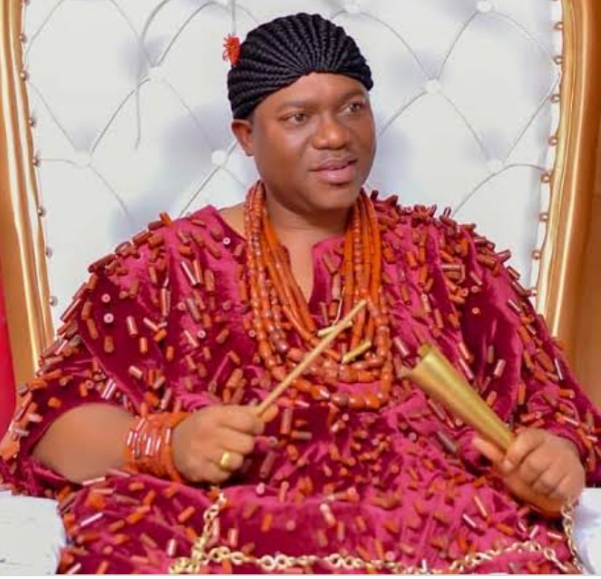The idea to interview the Olowo of Owo, Ondo State, His Imperial Majesty, Oba Ajibade Gbadegesin OgunoyeIII was conceived six months ago between myself and the Adaja of Owo Kingdom, Chief Olamide Fadimiluyi. It however could not hold until last week at the installation of a good friend, Chief Olusoji Ehinlanwo as the Owagbeminuyi of Owo Kingdom. The idea is to take a particular look at the traditional, culture, and justice system of the ancient kingdom that is over 1000 years old.
Oba Ogunoye is the 32nd Olowo, and a traditionalist to the core. Besides, he is a senior lawyer who retired as a Permanent Secretary in Ondo State before ascending the throne of his forbears in 2019. He is totally dedicated to the peace, prosperity and well being of his people and country.
In this interview, he shares the culture, tradition, and the justice system of his ancient kingdom with Gavel International. He further gave his thoughts on the way to improve the modern day adminstration of justice system in Nigeria. The interview is conducted by the team led by Mustapha Ogunsakin(Publisher). Other team members include Steve Akadiri, Chief Soji Ehinlanwo, Chief(Ms) Kemi Adefolu, and Dr Olusegun Abejide(From Texas, US).
Excerpts:
Kabiyesi, you have been on the throne for a couple of years. How has your journey been on the throne?
My journey on the throne of the Olowo since August 2019 has been wonderful. It has been challenging but also rewarding as well. I think I’ve lived up to the expectations of my people in terms of leadership, ensuring peace which is sine qua non to anything. When there’s peace, every other thing develops at a steady pace. We have attracted attention and we have promoted our culture as well. So it’s been wonderful that people are satisfied with my selection and enthronement as the 32nd Olowo of Owo.
Kabiyesi, you’re a seasoned Lawyer, and seasoned bureaucrat. How has your profession and experience in the civil service affected your service to the people now? Is there any correlation between the two?
There has been correlation, so to say. I was two years old when my father ascended the throne as the Olowo in 1968, so I practically lived with him while he was here for almost 25 years and was only out during my school days when I was in the university. So I think I have the experience that is traditionally required to be in the throne of the Olowo. There’s nothing strange to me anymore since the days of my father because I was very close to him. However, my experience in the civil service and being a lawyer has really helped me. I was an administrative officer in the Ondo civil service before I rose through the ranks to become a Director, and later to be appointed Permanent Secretary. So those experiences much more prepared me to use modern techniques in the administration of this ancient Kingdom and my being a lawyer as well has helped me to avoid things that are against natural Justice and are repugnant to equity and good consciences. It has been wonderful, and those days outside the Palace before my enthronement really prepared me.
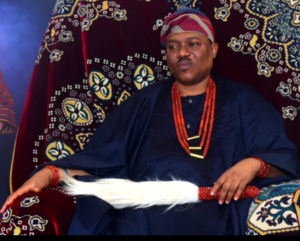
I have lived up to expectations. I’m sure if you go into town and ask the people they would tell you that they are satisfied.
I asked that question particularly because our people have been looking at the constitutional way in the administration of Justice as against the traditional Justice system that our forefathers had. Now, with the benefit of being a lawyer, and now a Kabiyesi, what is the Owo Justice system? Can it still be used today?
Definitely. Even before the coming of the colonialists, Yoruba land, particularly this ancient kingdom had it’s features of governance. Every aspect was combined with the king – the legislative, Executive and the Judiciary. Since times past, we have had our traditional sessions here. We called it ‘Igbemo Alele’. It is the assembly of the inner caucus where the Olowo oversee cases in council with the Chiefs. The courtyard where we installed Chief Owagbeminuyi is usually the venue of our court session where diverse cases are brought to the Palace, ranging from marriage to economic cases. The only thing that we don’t really handle is the criminal aspect. In the time past, the Olowo in council usually presided over that, but since the colonial times which led to independence and our own modem way of governance, that has been removed from the traditional setting.
Although, there are times when we help settle criminal cases when both parties agree that we should help them resolve their issues. Our traditional court session holds every Friday.
The Olowo holds his own personal court sessions here or in any of the courtyards where cases that are immediate and don’t require waiting are quickly attended to. Thanks to that, our people have easy access to justice, the time factor is eliminated because, unlike the conventional courts where cases are adjourned time and time again, here we adjourn cases a maximum of 2 times, and that only happens when we need to visit the area where the event occurred(locus in quo) or send Chiefs to inspect.
Asides from those scenarios, we handle cases as they are brought in. That has eliminated the issue of delay, adjournment and it’s completely free. The people don’t have to pay and they have easy access. They can bring in any case and we summon the other party, and resolve the issues.
In Owo now, some people don’t bother going to the conventional courts. They would rather come here. I think the Ondo state Judiciary has equally recognized that and is trying to have a court in the Palace. The immediate past Chief Judge of the State Justice Akeredolu was developing that, but I don’t know what has happened to that for now.
It has been really wonderful and that shows the fact that this is ours. We don’t have to follow the Western ideas hook, line and sinker. When the whites first came to Yoruba land, they were marveled by the system of governance that was in place. There was nothing they had there that we didn’t have at that time. I believe that with time, we can build on what we have although there will be challenges.
There are some donor agencies now that are supporting the Palace Justice system because they believe that the Court system is adversarial while Yoruba’s have this saying *proverb: A kii to Ile Ejo de ka sore(we cannot be friends again after court)
Our own system is reconciliatory, so people feel that that is better. In Your own recommendation sir, If today there is a means to input these traditional ways of settling disputes into the Constitution, will you support it?
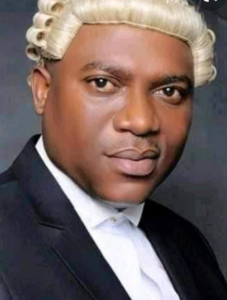
I would do so wholeheartedly. I think that is the way to go. Nigerians are now realising the fact that we have lost a lot of our systems and ways of life, including our health system. The Westerners persuaded us away from that. When I was young we had access to traditional drugs that were indigenously produced. Even words can heal and I’ve experienced it. There was a time one of my sisters was sick with stomach pain. We had an Uncle then who spoke to the stomach, and immediately the pain stopped.
In Africa as a whole, we have lost a lot. The West really persuaded us away from our ways of life, and that’s why we still face a lot of challenges. Even our oath taking system. Now we have people swearing by the Bible or Quran and immediately after breaking their oaths. Let them swear by the Sango or Ogun (laughs) everything would be straightened. If we have to go that far, why not.
Kabiyesi, yesterday at the court where we had the Chieftaincy ceremony, in the course of discussing with people, we were made to understand that there’s nothing you say in the courtyard that doesn’t come to pass. Is this true?
It’s true. There is a power there that was caged. It was at the beginning. Whatever the Olowo says must surely come to pass.
Is there a particular name for that?
We call it ‘Ogho’. We have it in different places, but that one in particular is there to affirm the authority of the Olowo. Whatever he says there comes to pass be it prayers or curses they all come to pass
there. That is why when we have some important things to do, we do them there. During our court sessions, nobody dares to lie because if he or she lies, they know the consequences. When we sense that someone is being untruthful, we tell them to look behind them and they begin to tell the truth.
With profound respect Kabiyesi, please can you mention one or two examples of the reality of what you just said.
(Laughs) They are many. When Asiwaju Bola Tinubu Ahmed came here, we had a good environment to receive him in the modern part of the Palace but we took him there because whatever the Olowo says there usually comes to pass and I think we are living witnesses to the level he has attained.
It’s very interesting sir because we’ve read about history, and people mentioned it yesterday. This is one of the biggest and most traditional Palaces in Africa and the culture is quite amazing. How can we encourage our people to start respecting their culture and tradition and how do you as the Kabiyesi encourage your people both in Owo and across the Yoruba land to start respecting their culture and tradition to make it a way of life again?
Every society is built on culture or tradition. There’s no society that doesn’t have its own culture or tradition. But some have been persuaded away from theirs and I think we’re living witnesses of that in Africa.
However, we in Owo have preserved ours. In fact, the people of Owo don’t joke with their culture. It’s a way of life here. Though we have Christian and Muslims when it comes to tradition, we are all in it together.
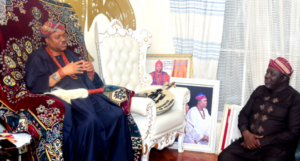
We have a festival called Igogo festival. It’s a festival of love, culture and tradition. Anybody who witnesses it will see culture at its best. It lasts for 17 days and usually starts towards the end of August and ends in the middle of September. The days are not static, but are calculated based on our market days, so it’s traditional we don’t just pick the days at random. The festival is of international standard.
It developed naturally during the life of the 13th Olowo called Rerengejen. In his time, a very beautiful woman of unknown origin appeared in the Kingdom. Her name was Oronsen. The report was made known to Olowo and he requested that the woman be brought to the Palace. When she was brought, he saw her beauty and requested her hand in marriage, which she refused. He however was persistent and kept pleading for her hand and she eventually told him she couldn’t get married to him because she had taboos she must preserve and if she married the king, he wouldn’t be able to preserve them. When asked, she told him that she had three taboos. The first was that a bundle of firewood carried on the head must never be thrown down in her presence. The second, a bowl of water must never be splashed in her presence and the last being that she could never witness a bowl of Okra being pounded. Undeterred, the king promised to keep these taboo’s for her so she later agreed to marry him.
Although the king had other wives, she became the king’s favorite after they got married, which made the other Queens jealous and conspired against Oronse.
When the king went out for his annual hunting expedition, the other Queens out of jealousy broke Oronsen’s taboos in succession in her presence. Oronsen, disappointed, immediately left the Palace and entered into the forest. When the king returned from his expedition, the report was made known to him and he called for the Iloro Chiefs.
The Iloros quarters in Owo house the people who accompanied the Olowo right from Ile-Ife. The king called for the Chiefs, especially the able bodied men called the Ogbama who were powerful and commanded them to look for Oronse in the forest. So they fortified themselves and went into the forest in search of the Queen. Along the way, they saw her hair pin called Eka, and after a while her headtie. Suddenly, she appeared to them and they pleaded for her to return to the Palace but she refused saying she would never return despite her love for the king because her taboo had been broken. She asked them to tell the king to institute a festival in her honour so she would continue to be with and protect the king. She requested that during the festival, there should be no beating of leather drums, and no booming of guns.
Before all this happened, when Oronsen was still in the Palace, she requested for a room to defecate in, which she was provided. The first time she made use of the room, then came out and asked the king to enter the room, and when he did he saw a lot of beads of different shapes, colours and sizes. She said she was in the Palace to bless the King.
In Owo, our beads are quite unique and different from most beads we have akan, seseki, and a lot more.
So when the team arrived and relayed her message, the King then instituted the Igogo festival. Oronsen requested that no leather drums be beaten and only gongs called Agogo be beaten during the festival. That is where the name Igogo festival was derived from. During the festival, we see the king in his traditional element, dressed like a woman in Coral beads.
For the 17 days, different activities go on and is climaxed with the king dancing round the town with the chiefs dancing round the town the day before. A lot of sacrifices are done to Oronsen where prayers are said for the King, the Kingdom and the people of Owo. This festival has been with us since the time of the 13th Olowo which shows just how much we’ve been able to preserve our culture. The only other places I can say have been as successful in preserving their culture is Benin and Ile-Ife.
In recent times, some kings have clamored to alter ancient traditions. For instance, in Ogun state I’m aware that some people came up to say that an Oba should be allowed to be buried in a Muslim or Christian way. Would you support that kind of thing Kabiyesi? I know that Aláàfin kicked against it then, he even wrote a letter to the governor of Ogun state at one point.
There’s nothing strange about the burial of Kings although some people claim that in past times there were a lot of harmful practices which is why I said earlier on that our tradition has avoided things that are repugnant to natural Justice and good conscience. We’ve been able to tailor our culture to soothe our ways of life. There has not been a King who has joined his ancestors who has not been well laid to rest. We have a specific chamber for that here, a hallowed chamber that if you’re not part of the system traditionally, you cannot enter. There’s nothing strange there.
When I was enthroned I told people that first and foremost I am a traditionalist. When the Christian or Muslims do their own traditions I am with them, because they are my people, but first and foremost I am a traditionalist
Should we expect more Queens in the Palace Kabiyesi, since it’s part of tradition and you’re a traditionalist?
There was a time I was interviewed along that line and I said that every man is innately polygamous. There is nothing strange with a King having two or more wives. Even ordinary people do the same.
Kabiyesi I grew up here sir, and one of the unique things about this town that I met and have been committed to is the peculiarity of time and places. We drove this morning, and I discovered that all the markets were still there and we couldn’t pass through.
I also discovered that during the process of my brother’s Chieftaincy, Kabiyesi said we cannot install a chief on a market day.
Sir, how have you been able to sustain it? We live in Lagos and there’s nothing like a particular day, or any special day for a market in Lagos. So sir, how have you been able to enforce this. Also what are the do’s and don’ts traditionally about the customs that are peculiar to Owo. I learned that in Oja Oba (King’s market) for example, women are not allowed in without scarves or head ties.
There are a lot of traditions. Well, let me start by saying that the markets here are institutionally emplaced by the throne. All the markets are the king’s market. This Oba’s market is so unique because it is close to the Palace. The ughagbe market is equally the king’s market. The transactions that usually take place in those markets are based on our culture and tradition. The Oba’s market is held for three days, then we move to the Ughagbe market for one day and return to Oba’s market. It is based on our tradition.
There is another market called the Oghuata market, and we don’t hold that until the King has joined his ancestors. Then the two markets will be closed temporarily, until the enthronement of a new Olowo. Those are the three major markets. Asides from that, we also have the eyinogbe market and three other markets that are unique to the Iloro- the people that followed the Olowo from ife and although you might not see them being operated physically, they are operated spiritually. We have Omunshe, Arigidi, and Oghuata.
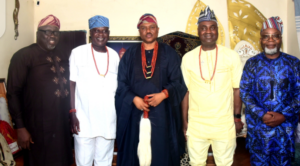
The Ughagbe market that holds for a day after the main market is highly spiritual in the sense that spirits usually attend the market which makes it a market that people fear a lot. So in the market as you said, a woman must cover her head before conducting any activity there. Also, you don’t sell pounded yam in the market, bring in a bunch of bananas or corn that is still covered. In fact, corn cooking or selling corn in general is prohibited. Akara is not allowed.
So Kabiyesi, what are the penalties of disobedience of these rules?
Offenders are sanctioned by the Iloro. The Iloro are in charge of our culture generally, and they have their systems of punishment. They may ask you to bring a he goat or she goat, palm oil and if your offence is quite heavy, they may ask for a black cow.
Kabiyesi, despite the gods and our ancestors protecting the land, there are still paramount security issues in Owo. What are traditional ways of preventing a re-occurence?
Well, things do happen. There are some things that we may not be able to prevent if someone is planning evil. However since that issue occurred, we have taken out some traditional steps and with the arrest of some of the perpetrators, it points to the fact that we are not resting on our oars.
Kabiyesi, you have given us a lot of insight on the customs and traditions of Owo, and I think it’s very important that these traditions which have been passed through generations are documented so that future generations both at home and in diaspora can have insight to these traditions lest they end up being forgotten. Are there any efforts to capture these historical facts about our way of life, the Kingdom and its people?
We already have some publications written by our people on the history and traditions.
Some have even used our culture as their thesis even at doctoral levels in Universities home, and abroad. We have a lot on it and are planning again to institute a team of writers to go into areas that have not been captured. We have also developed a website where some of these things are being documented.
Dear readers, we really need your support to keep on serving you with authoritative, truthful, and juicy stories everyday. For your support, please reach out to the editor @gavelinternational66@gmail.com

